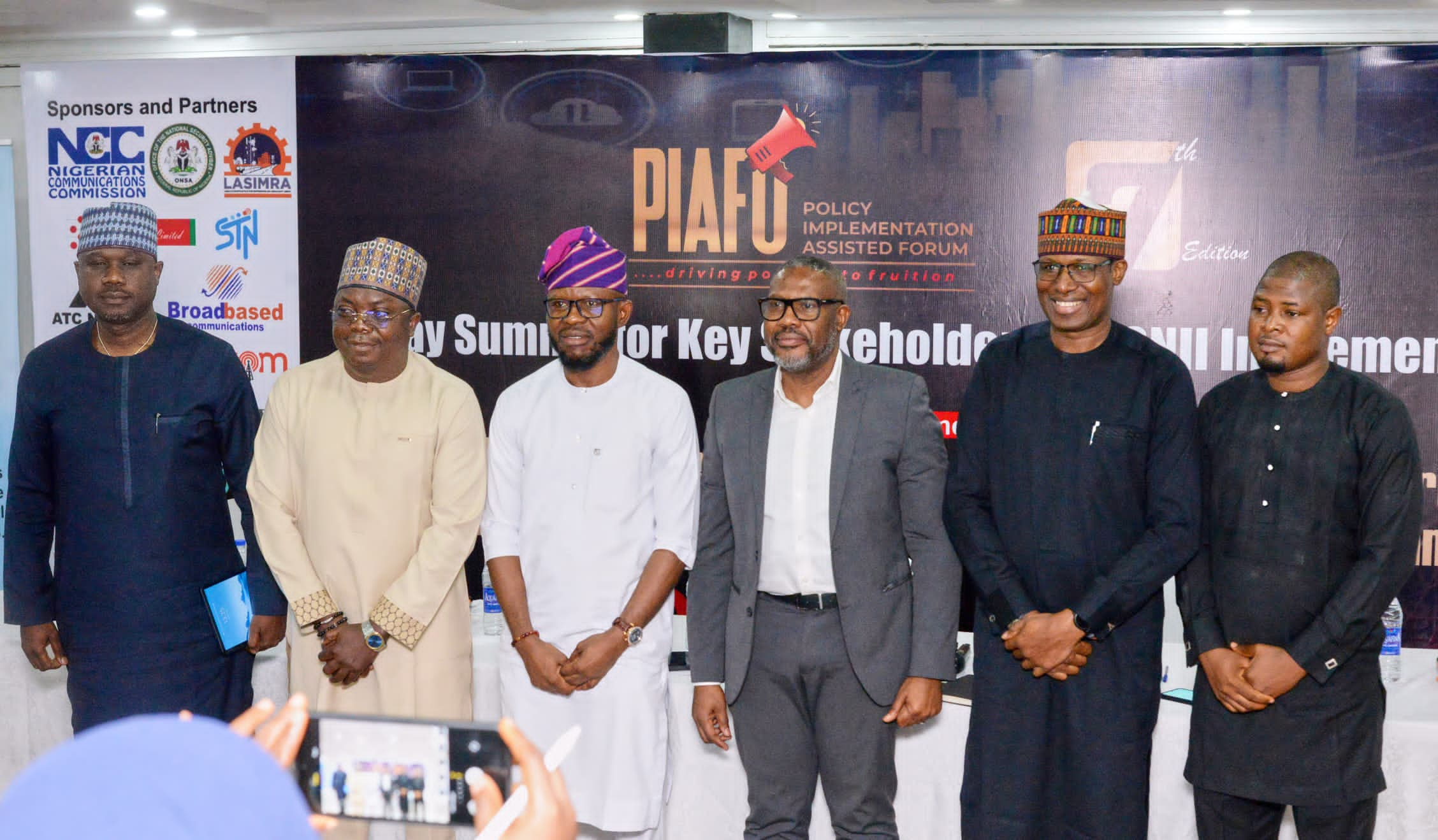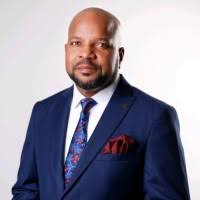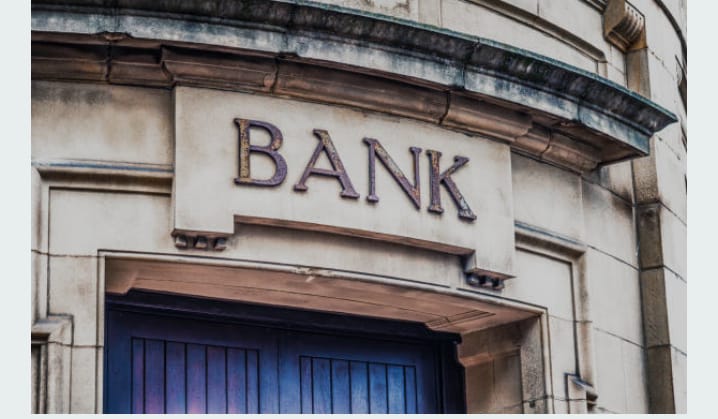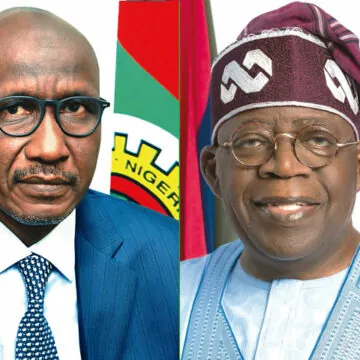News
We need more than CNII Order to secure telecom investments – Experts

Industry leaders have identified important measures to secure telecommunications infrastructures in the country and ensure that investments in the telecoms space are protected.

They argued that as much as the effective implementation of the Executive Order on the Designation and Protection of Critical National Information Infrastructure (CNII) is important, the Order cannot solely guarantee infrastructure safety except certain internal and standardisation issues are first resolved by operators.

Speaking at the 7th Policy Implementation Assisted Forum (PIAFo) Summit on CNII implementation held Thursday in Lagos, the industry leaders highlighted pressing issues such as infrastructure vandalism, unauthorized installations, and cable theft, while proposing actionable solutions to safeguard the country’s critical national infrastructure.
Gbenga Adebayo, Chairman of the Association of Licensed Telecommunications Operators of Nigeria (ALTON), stressed the importance of proper infrastructure maintenance and installation to prevent vandalism and theft.
He highlighted the widespread issue of stolen manhole covers and poles, attributing the problem to poor maintenance practices. “When properly installed, these components are difficult to remove. However, due to negligence, they are often left unsecured, making them easy targets for theft,” he said.
Adebayo also pointed out that community resistance to infrastructure projects has significantly hindered progress. He recounted instances where local communities prevented trucks from accessing sites due to previous unaddressed damages caused by contractors.
“A diesel supplier was blocked from entering an estate because a previous contractor had damaged their property and failed to make repairs. This lack of accountability breeds distrust and delays crucial projects,” he explained.
He urged stakeholders to foster better relationships with communities to prevent such conflicts.
Another critical issue Adebayo identified was the unauthorized installation of infrastructure without government approval, leading to inadvertent damage during road construction projects.
“Government agencies often damage unregistered infrastructure simply because they were not documented in official records. Proper approvals and collaboration with authorities will ensure accountability and protection of critical infrastructure,” he noted.
He called for improved industry coordination to resolve these challenges internally before seeking external solutions that are promised by the CNII provisions.
Echoing these concerns, Tony Emoekpere, President of the Association of Telecommunications Companies of Nigeria (ATCON), emphasised the need for standardisation and better coordination among stakeholders.
He pointed out that Nigeria’s infrastructure challenges go beyond technical issues, extending into environmental and moral concerns.
“We are dealing with a moral challenge. An engineer who switched from diesel to gas generators encountered a new problem—workers began stealing engine oil instead, as they could no longer siphon diesel. These issues require both technical and ethical solutions,” he explained.
Emoekpere argued that standardisation is the key to long-term sustainability. “If infrastructure is deployed in a suboptimal manner, failure is inevitable. We need to establish proper standards that all stakeholders—government, private sector, and the public—can align with,” he stated.
He also emphasized that Nigeria has strong policies, such as local content policies, but implementation remains a major challenge. “We must move beyond discussions and focus on actionable steps, follow-ups, and policy enforcement,” he added.
The importance of addressing cable theft and vandalism was further stressed by Wale Owoeye, CEO of Cedarview Communications Limited.
He described the alarming frequency of cable cuts, which disrupt network operations and drive up maintenance costs.
“Cable theft is a serious issue. Airtel representatives told me they experience a cable cut every six minutes. The assumption that all black cables contain valuable copper leads to reckless vandalism,” he explained.
To combat this growing problem, Owoeye proposed three key approaches, including reorientation, enforcement, and proactive measures.
“We need to engage local communities in their native languages, educating them on the consequences of vandalism. Strict legal penalties, including long-term imprisonment, should be enforced to deter offenders,” he said.
He also emphasized the need for preventive strategies rather than reactive responses. “Prevention is always more effective and cost-efficient than restoration,” he noted.
As a proactive measure, Owoeye proposed the creation of a dedicated fund to support advocacy and awareness campaigns across Nigeria.
To demonstrate his commitment, he pledged to contribute N500,000 quarterly as a seed fund and encouraged other industry players to follow suit.
“This is like planting a seed. With collective effort, we can grow it into a sustainable solution for protecting Nigeria’s telecom infrastructure,” he said.
The speakers collectively emphasised that addressing these challenges requires collaboration among industry players, government agencies, and local communities.
They called for a concerted effort to enforce policies, engage stakeholders, and implement practical solutions that will ensure the long-term sustainability of Nigeria’s telecommunication infrastructure.

News
Deputy Speaker, Kalu appoints Hart as new Chief of Staff

Deputy Speaker of the House of Representatives, Rt. Hon. Benjamin Okezie Kalu has appointed Sam Ifeanyi Hart, Esq. as his new Chief of Staff (CoS).

Hart replaces Hon. Toby Okechukwu who was recently appointed Executive Director, Projects of the newly established South East Development Commission (SEDC).

Prior to his appointment, Hart served as Special Adviser to the Deputy Speaker on Public Affairs and has an extensive background in training and consultancy.
Hart also previously served as Director-General, Abia State Marketing and Quality Management Agency from 2019 to 2023 after occupying other appointive positions.
He was also a member of National Institute for Policy and Strategic Studies (NIPPS), Kuru where he attended the Senior Executive Course 45, serving as Course Secretary-General.
He has also served on the Boards of several corporate and non-governmental entities.
Hart brings a wealth of knowledge and experience to his new role, with a distinguished career spanning law, leadership, and public service.
A lifelong learner, he holds multiple academic qualifications, including a Master’s Degree in Environmental Law (LLM) and a Bachelor’s Degree in Law (LLB) from Abia State University.
The new Chief of Staff is also currently pursuing a Doctorate Degree in Law.
A seasoned professional, Hart has attended prestigious institutions, including the GOTNI Leadership Centre, National Institute for Policy and Strategic Studies (NIPPS), and the School of Politics, Policy and Governance (SPPG).
He is also a member of several professional bodies, including the Chartered Institute of Directors of Nigeria (M.IoD), Nigerian Institute of Chartered Arbitrators (ACIArb), and the Nigerian Bar Association (NBA).
As Chief of Staff, Hart will provide strategic guidance and support to the Deputy Speaker legislative activities, leveraging his expertise to drive policy initiatives and promote good governance.

News
Beware of ATM Card Swap: A Growing concern in Nigeria

By Abah Benjamin Eneojoh

As Nigerians continue to rely on Automated Teller Machines (ATMs) for their daily financial transactions, a new trend of card swapping has emerged, leaving many victims bewildered and financially vulnerable. In this article, we will explore the root of this issue and provide guidance on how to avoid falling prey to this scam.

The Modus Operandi
The scam typically occurs when an ATM user inserts their card into the machine, only to have it retained or spat out. In many cases, the machine may appear to malfunction, prompting the user to remove their card and reinsert it. However, unbeknownst to the user, the machine may have swapped their card with a different one, often with a similar appearance.
The Consequences
When the user attempts to use the swapped card, they will inevitably encounter difficulties, as the card will not match their password or PIN. This can lead to frustration, financial losses, and even identity theft.
Implementation and Prevention
To avoid falling victim to this scam, it is essential to be vigilant when using ATMs. Here are some preventive measures to take:
1. Verify the card*: Before reinserting your card into the ATM, ensure it is indeed your card. Check the name, card number, and expiration date to confirm its authenticity.
2. Be cautious of malfunctioning ATMs*: If the ATM appears to be malfunctioning or retains your card, do not attempt to reinsert it. Instead, contact your bank or the ATM operator to report the issue.
3. Monitor your account activity*: Regularly check your account statements to detect any suspicious transactions.
4. Use ATMs at secure locations*: Opt for ATMs located in well-lit, secure areas, such as bank branches or shopping malls.
Tracing the Root of Card Swap
While the exact cause of card swapping is still unclear, it is believed to be the result of a combination of factors, including:
1. ATM maintenance and repair: Poorly maintained or repaired ATMs may be more prone to card swapping.
2. Card skimming and shimming: Criminals may use card skimming or shimming devices to steal card information and swap cards.
3. Insider involvement: In some cases, bank employees or ATM technicians may be complicit in the card swapping scheme.
Conclusion
Card swapping is a growing concern in Nigeria, and it is essential for ATM users to be aware of the risks and take preventive measures. By verifying the card, being cautious of malfunctioning ATMs, monitoring account activity, and using ATMs at secure locations, Nigerians can reduce their chances of falling victim to this scam. Remember, vigilance is key to protecting your financial security.
Eneojoh writes from Lokoja, Kogi State, Nigeria

News
Tinubu fires Kyari as NNPC CEO, board members

President Bola Ahmed Tinubu has fired the Group Chief Executive Officer of the Nigerian National Petroleum Company (NNPC) Limited, Mallam Mele Kyari from office.

All the board members of NNPCL led by Chief Pius Akinyelure have also been sacked, according to a statement made available to Media Houses in the early hours of Wednesday by the Special Adviser to the President on Information & Strategy, Mr Bayo Onanuga.

Onanuga said, all board members who were appointed in November, 2023 were dissolved to give way for new members.
Meanwhile, President Tinubu inthe statement acknowledged the effort of Mele Kyari and his team in their contributions to rehabilitating the Port Harcourt and Warri refineries, which enabled the resumption of petroleum production.
The statement partly reads, “President Bola Ahmed Tinubu has approved a sweeping reconstitution of the Nigerian National Petroleum Company (NNPC) Limited board, removing the chairman, Chief Pius Akinyelure and the group chief executive officer, Mallam Mele Kolo Kyari.
“President Tinubu removed all other board members appointed with Akinyelure and Kyari in November 2023.”
In the new 11-member board, Engineer Bashir Bayo Ojulari has been named as the Group CEO, while Ahmadu Musa Kida takes over as the non-executive chairman. Adedapo Segun, who replaced Umaru Isa Ajiya as the company’s chief financial officer last year, has also been appointed to the new board.
Representing the country’s six geopolitical zones as non-executive directors are Bello Rabiu (North West), Yusuf Usman (North East), and Babs Omotowa (North Central). Others include Austin Avuru (South-South), David Ige (South West), and Henry Obih (South East).
Additionally, Mrs Lydia Shehu Jafiya from the Federal Ministry of Finance and Aminu Said Ahmed from the Ministry of Petroleum Resources have been appointed to represent their respective ministries.
According to the statement, the appointments take effect immediately, with President Tinubu citing Section 59, subsection 2 of the Petroleum Industry Act, 2021, as the basis for the restructuring.
The statement noted that the move is aimed at improving operational efficiency, restoring investor confidence, increasing local content, driving economic growth, and advancing gas commercialisation and diversification.
The new board has been tasked with conducting a strategic review of NNPC’s portfolio, particularly its operated and joint venture assets, to align them with value maximisation goals.
As part of its targets, the administration is pushing to increase oil production to two million barrels per day by 2027 and three million by 2030, while gas output is expected to reach eight billion cubic feet daily by 2027 and 10 billion by 2030.
The new board is also expected to expand NNPC’s share of crude oil refining, aiming for 200,000 barrels per day by 2027 and 500,000 by 2030.

-

 Security4 days ago
Security4 days agoNew Commissioner of Police in Niger, Elleman sends strong warning to criminals
-

 News3 days ago
News3 days agoAbia: LG Chairman, Iheke accused of using soldiers to detain IRS agent, claims Governor Otti’s support
-

 News4 days ago
News4 days agoKogi Governor, Ahmed Usman Ododo salutes Tinubu at 74
-

 News4 days ago
News4 days agoPlateau LP stakeholders endorses Barr Gyang Zi’s defection to APC
-

 News2 days ago
News2 days agoKogi government bans rallies ahead of Natasha’s homecoming slated for Tuesday
-

 News2 days ago
News2 days agoIran may secure a deal before Trump’s deadline – or face Israeli strikes in Tehran – analysis
-

 News4 days ago
News4 days agoAkpabio pays historic visit to office of SA to President on Senate Matters
-

 Business4 days ago
Business4 days agoFCT Minister reveals how he would aggressively pursue revenue collection, tours infrastructure



















